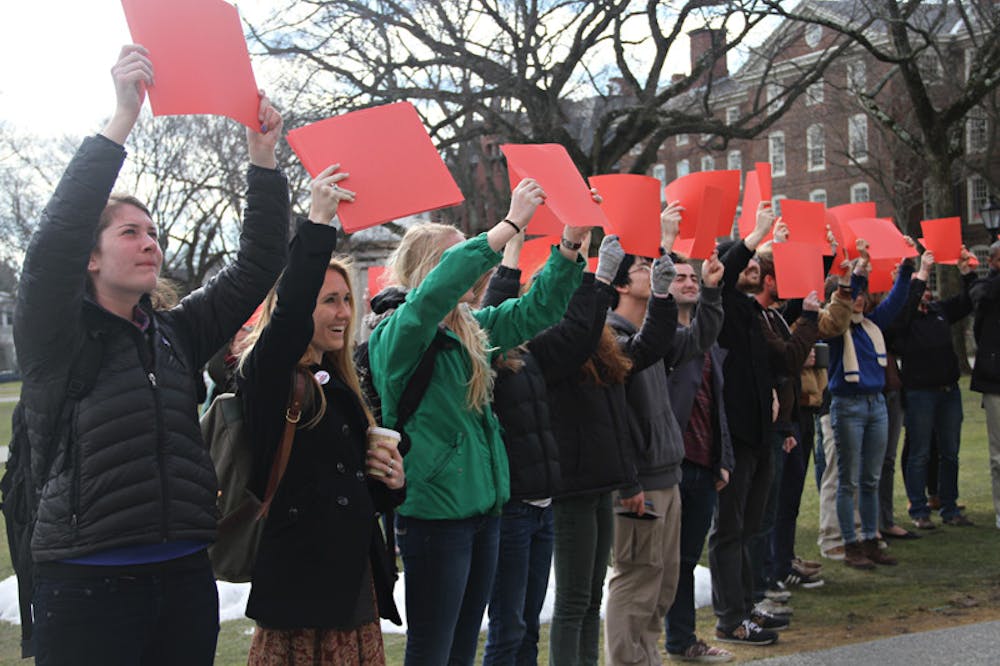The Undergraduate Council of Students is set to consider another resolution in support of Brown Divest Coal, said Todd Harris ’14.5, UCS president.
After Council leaders attended a Divest Coal meeting earlier this month, Divest Coal members are drafting a resolution to present to a UCS “working group,” Harris said.
Last spring, UCS voted to pass a resolution in support of divesting the University’s endowment from major coal and fossil fuel companies. But resolutions are not typically binding from year to year due to changing Council members.
“Having previous statements of support restated is super important, and UCS was one of our strongest supporters in the past,” said Ryan Greene ’16, a Divest Coal member.
The Council’s current consideration of support of divestment arrives after the Corporation’s October decision not to divest.
Council leaders hope to “continue the conversation about coal,” Harris said. “We’ve also just been trying to brainstorm new ways to support student initiatives and student groups on campus, Divest Coal being one of them and one of the hot topics throughout the year.”
The Council has the important role of “going to student group meetings, student advocacy causes like Divest Coal and having conversations about what methods have you tried, what methods can we help you with, where can we partner to get data, information and decision-makers all in a place where we can have a more informed conversation about these issues,” said UCS Vice President Sam Gilman ’15.
When working with student advocacy groups, “UCS can support them, but we also don’t want to subsume or take over different causes from other groups,” Gilman added. “We want to be a partner, a supporter and an advocate, but to not take over advocacy efforts.”
Tammy Jiang ’16, a Divest Coal member, said she anticipates the Council will vote in favor of the resolution. “They have endorsed us (in the past), but obviously there’s a new UCS general body this year and we’re eager to have them pass another resolution,” she said.
The Council is “supposed to be representative of student voices,” Jiang added.
About 44 percent of undergraduates said they disagreed with the Corporation’s decision not to divest in a November Herald poll, compared to roughly 28 percent who agreed.
Divest Coal members are still in the process of clarifying the resolution’s wording, Greene said, adding that he hopes it includes language conducive to letting future Councils continue to pass resolutions supporting divestment.
When Divest Coal finishes writing the resolution, it will be passed on to a UCS working group dedicated to community engagement, “which includes amongst other things issues related to social justice and political student advocacy on campus,” said Cameron Johnson ’17, who is both a Divest Coal member and a UCS general body member. After that group deliberates, the resolution will come before the UCS general body for a vote.
Divest Coal plans to use UCS to try to “mobilize all the undergraduate students to further this conversation and show the administration that this is something we still find important, something we want to talk about,” Johnson said.
“I realized that if we want to take something as important and urgent as divestiture, … we need to use UCS as a mechanism,” he added. “Luckily UCS believes in the same thing, so we’re really working in tandem right now, and it’s been going swimmingly.”
At a March 2 Divest Coal meeting attended by UCS leaders, each side presented ideas for how the groups could collaborate, Johnson said, adding that he was happy to see Harris and Gilman present.
“We talked about what type of things we’d like to see UCS do,” such as creating “language in the resolution that not only supports divestiture but pushes UCS to make statements and stands after the resolution has passed,” he said.
“They were tossing ideas back and forth about where they could fit in and where we could fit in, and right now it seems like a lot of it is going to be publicity,” said Divest Coal member Jahmour Givans ’16. “Todd and Sam seemed very receptive — they presented some of their ideas but they were mostly listening to what we had to say.”

ADVERTISEMENT




